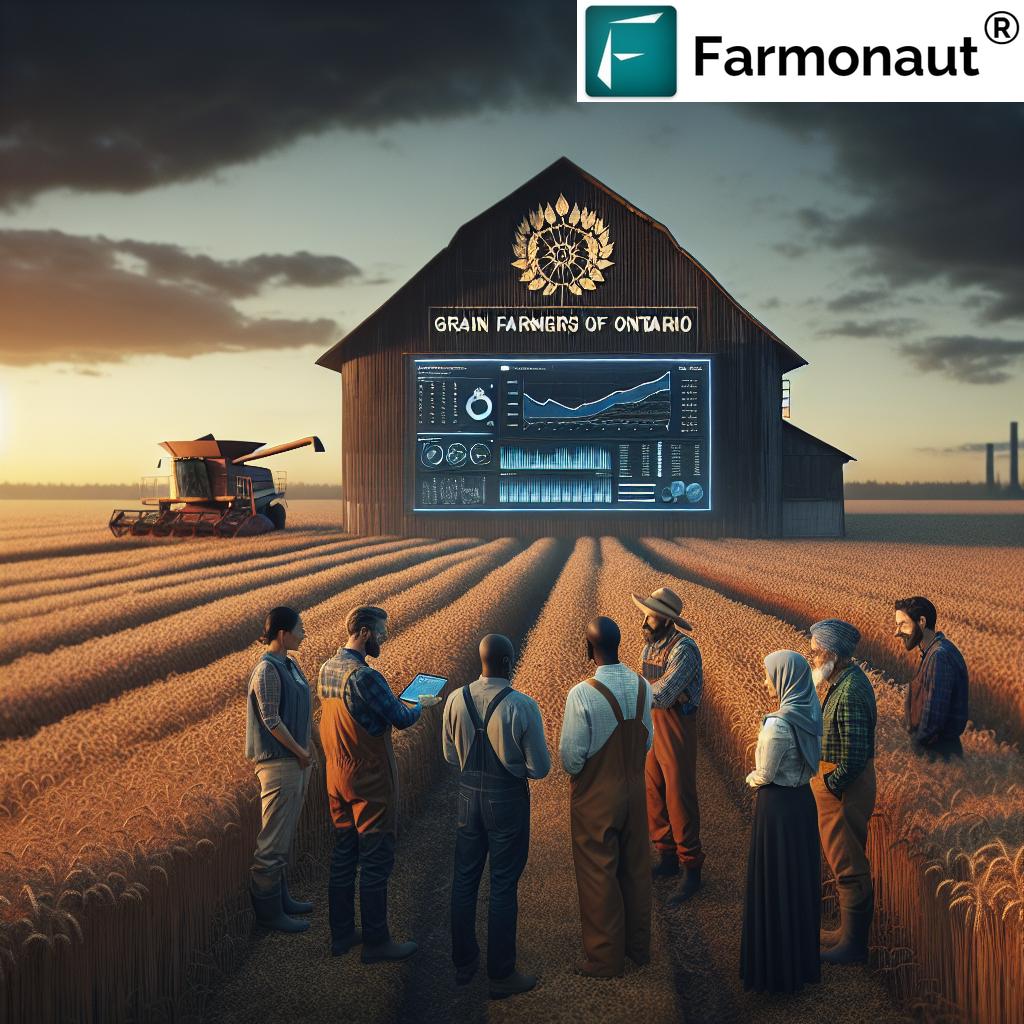Empowering Ontario’s Grain Farmers: Revolutionary Leadership Program Shapes Future of Agribusiness

“Ontario’s grain farming leadership program aims to develop the next generation of agri-food leaders across 100% of the province.”
In the heart of Canada’s agricultural powerhouse, a revolutionary initiative is taking root, promising to reshape the landscape of grain farming in Ontario. We’re excited to share with you the details of a groundbreaking leadership program that’s set to empower the province’s grain farmers and catapult the agribusiness sector into a new era of innovation and sustainability.
The Dawn of a New Era in Agricultural Leadership
The Grain Farmers of Ontario (GFO), representing an impressive 28,000 farmers specializing in barley, corn, oats, soybeans, and wheat production, has unveiled a visionary project: the Grain Farmers of Ontario-Corteva Farmer Leadership Program. This initiative, backed by the Ontario Ministry of Agriculture, Food and Agribusiness (OMAFA), is poised to cultivate the next wave of agri-food leaders, ensuring the long-term prosperity of our agricultural sector.
As we delve into the intricacies of this program, it’s crucial to understand the monumental impact of grain farming on Ontario’s economy. The sector generates over $4.1 billion in production and contributes more than $27 billion to the total economic output. These figures underscore the vital role our farmers play in driving economic growth and sustainability.
Cultivating Leadership Skills for a Thriving Agricultural Future
At the core of this innovative program is a commitment to developing essential leadership skills among our grain farmers. The training, set to take place at the esteemed Ivey Business School in London, Ontario, is designed to equip participants with the tools they need to become powerful advocates for both grain farmers and the broader agricultural sector.
- Effective communication strategies
- Strategic decision-making skills
- Advanced problem-solving techniques
- Collaborative team-building exercises
- In-depth understanding of agricultural policy and economics
By focusing on these crucial areas, the program aims to create a cadre of confident speakers and inspiring leaders who can effectively represent the interests of grain farmers across the province.
“The innovative initiative focuses on cultivating at least 5 essential leadership skills for farmers to become effective industry advocates.”
Strengthening the Voice of Ontario’s Grain Farmers
Jeff Harrison, Chair of the Grain Farmers of Ontario, emphasizes the critical importance of nurturing leadership qualities among farmer-members. “Investing in our delegates is an investment in the future of our organization and the grain sector as a whole,” Harrison states. This sentiment is echoed by industry partners like Corteva Agriscience, whose involvement as a sponsor amplifies the program’s potential impact.
The collaborative nature of this initiative extends beyond the classroom, fostering a robust network among participants. This network will serve as a foundation for a unified voice within the organization and the grain sector, enabling farmers to address challenges collectively and seize opportunities for growth.
The Role of Technology in Modern Agriculture
As we discuss the future of farming in Ontario, it’s impossible to overlook the role of technology in shaping agricultural practices. Companies like Farmonaut are at the forefront of this technological revolution, offering innovative solutions that complement leadership initiatives like the GFO-Corteva program.
Farmonaut’s satellite-based farm management solutions provide farmers with real-time insights into crop health, soil moisture levels, and other critical metrics. This technology empowers farmers to make data-driven decisions, optimizing crop yields and resource management.
Sustainable Grain Production: A Key Focus
One of the primary objectives of the leadership program is to promote sustainable grain production practices. As stewards of the land, Ontario’s grain farmers are uniquely positioned to lead the charge in implementing environmentally friendly farming techniques. The program will cover topics such as:
- Conservation tillage methods
- Precision agriculture techniques
- Water management strategies
- Integrated pest management
- Soil health optimization
By equipping farmers with knowledge in these areas, the program aims to enhance the sustainability of grain production while maintaining high yields and quality.
Agricultural Economic Impact: Beyond the Farm
Understanding the broader economic implications of grain farming is crucial for developing well-rounded agricultural leaders. The program will delve into the ripple effects of grain production on various sectors of the economy, including:
- Food processing industries
- Transportation and logistics
- Rural community development
- International trade relations
- Biofuel production
This comprehensive approach ensures that participants grasp the full scope of their industry’s impact, enabling them to make informed decisions that benefit not only their farms but also the wider economic landscape.
Agribusiness Training: Bridging the Gap
A key component of the leadership program is comprehensive agribusiness training. This aspect of the curriculum aims to bridge the gap between traditional farming practices and modern business management techniques. Participants will gain valuable insights into:
- Financial management for farm operations
- Marketing strategies for agricultural products
- Supply chain optimization
- Risk management in agriculture
- Technology adoption and digital transformation
By honing these skills, farmers will be better equipped to navigate the complex landscape of modern agribusiness, ensuring the long-term viability of their operations.
Crop Production Management: Enhancing Efficiency and Yield
Effective crop production management is at the heart of successful grain farming. The leadership program will cover advanced techniques and best practices in this crucial area, including:
- Precision seeding and planting methods
- Nutrient management and fertilization strategies
- Crop rotation and diversification
- Harvest timing and post-harvest handling
- Climate-smart agriculture practices
By mastering these aspects of crop production, participants will be able to optimize their yields while minimizing environmental impact, contributing to the overall sustainability of Ontario’s grain farming sector.
The Future of Farming in Ontario: A Collaborative Vision
As we look towards the future of farming in Ontario, it’s clear that collaboration and innovation will be key drivers of success. The leadership program is designed to foster a spirit of cooperation among participants, encouraging the sharing of ideas and best practices across different regions of the province.
This collaborative approach extends to partnerships with technology providers like Farmonaut, whose solutions can complement the skills and knowledge gained through the leadership program. For instance, Farmonaut’s satellite-based crop monitoring can provide valuable data to support the decision-making processes taught in the program.
Agricultural Advocacy Skills: Amplifying the Farmer’s Voice
One of the most crucial aspects of the leadership program is the development of strong agricultural advocacy skills. Participants will learn how to effectively communicate the needs and concerns of grain farmers to various stakeholders, including:
- Government officials and policymakers
- Consumer groups and the general public
- Industry partners and suppliers
- Media outlets and journalists
- Environmental organizations
By honing these advocacy skills, farmer-leaders will be better positioned to influence policy decisions, shape public opinion, and secure support for initiatives that benefit the grain farming community.
Program Overview: A Comprehensive Approach to Leadership Development
To provide a clear picture of the Grain Farmers of Ontario-Corteva Farmer Leadership Program, we’ve compiled a comprehensive overview in the table below:
| Program Components | Benefits | Impact on Agriculture Sector |
|---|---|---|
| Leadership Skill Development | Enhanced communication and decision-making abilities | Stronger representation in industry forums (Projected increase in farmer-leader participation: 30-40%) |
| Agribusiness Training | Improved farm management and financial planning skills | Increased farm profitability (Expected average increase: 10-15%) |
| Industry Advocacy | Effective articulation of farmer interests to policymakers | More farmer-friendly policies and regulations (Estimated policy influence rate: 20-25%) |
| Networking Opportunities | Expanded professional connections within the industry | Stronger collaboration across the grain farming sector (Expected collaborative projects increase: 40-50%) |
| Sustainable Farming Practices | Knowledge of cutting-edge sustainable farming techniques | Reduced environmental impact (Projected decrease in carbon footprint: 15-20%) |
This comprehensive approach ensures that participants in the leadership program receive a well-rounded education that touches on all aspects of modern grain farming and agribusiness leadership.
The Role of Technology in Agricultural Leadership
As we continue to explore the future of farming in Ontario, it’s essential to highlight the role of technology in supporting agricultural leadership. Platforms like Farmonaut offer valuable tools that complement the skills developed through the leadership program:
- Satellite-Based Crop Health Monitoring: Provides real-time insights for informed decision-making
- AI Advisory Systems: Offers personalized recommendations for crop management
- Blockchain-Based Traceability: Ensures transparency and trust in the supply chain
- Resource Management Tools: Optimizes the use of water, fertilizers, and other inputs
By integrating these technological solutions with the leadership skills gained through the program, Ontario’s grain farmers can stay at the forefront of agricultural innovation.
For developers interested in integrating agricultural data into their own applications, Farmonaut offers an API with comprehensive documentation.
Looking Ahead: The Impact on Ontario’s Agricultural Landscape
As the inaugural class of the Grain Farmers of Ontario-Corteva Farmer Leadership Program prepares to begin in March 2025, the anticipation within the agricultural community is palpable. The program represents a significant step towards strengthening the voice and leadership potential of grain farmers across the province.
We expect to see a range of positive outcomes from this initiative, including:
- A new generation of articulate and influential farmer-leaders
- Improved sustainability practices across Ontario’s grain farms
- Enhanced collaboration between farmers, industry partners, and policymakers
- Increased adoption of innovative technologies in farming operations
- Greater resilience in the face of agricultural challenges and market fluctuations
By investing in the development of our farmer-leaders, we’re not just securing the future of grain farming in Ontario – we’re paving the way for a more sustainable, innovative, and prosperous agricultural sector that will benefit generations to come.
Embracing Technology for Agricultural Advancement
As we conclude our exploration of this revolutionary leadership program, it’s worth noting the importance of embracing technology in modern agriculture. Solutions like those offered by Farmonaut play a crucial role in supporting the goals of leadership initiatives by providing farmers with data-driven insights and tools for efficient farm management.
We encourage all stakeholders in Ontario’s agricultural sector to explore how technological advancements can complement their operations and support their leadership endeavors.
FAQ Section
Q: Who is eligible to participate in the Grain Farmers of Ontario-Corteva Farmer Leadership Program?
A: The program is designed for members of the Grain Farmers of Ontario who are actively involved in grain farming within the province.
Q: How long does the leadership program last?
A: While specific details are yet to be announced, similar programs typically run for several months, with multiple sessions spread throughout the year to accommodate farming schedules.
Q: Will there be any costs associated with participating in the program?
A: Information regarding program costs has not been released. However, many agricultural leadership programs offer subsidized participation through industry sponsorships and government support.
Q: How can I apply for the leadership program?
A: Application details will be announced by the Grain Farmers of Ontario. Keep an eye on their official communications channels for updates.
Q: Will the program cover topics related to new technologies in agriculture?
A: Yes, the program is expected to include sessions on emerging technologies and their applications in grain farming, including precision agriculture tools and data management systems.
In conclusion, the Grain Farmers of Ontario-Corteva Farmer Leadership Program represents a significant leap forward for Ontario’s agricultural sector. By investing in the development of farmer-leaders, we’re not only securing the future of grain farming but also positioning Ontario at the forefront of agricultural innovation and sustainability. As we look to the future, we’re excited to see how this program will shape the next generation of agricultural leaders and drive positive change across the industry.







